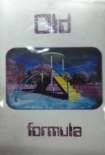 OLD Formula CASSETTE (Earache) 11.99
OLD Formula CASSETTE (Earache) 11.99Early on, Old (or Old Lady Drivers, as they were initially known) were avant-garde grindcore upstarts, early members of the Earache roster who released the weirdest albums that the label put out during their classic death metal period. Each new record from OLD continued to evolve further and further away from their early goofball thrash, though, and by the time the band released their fourth and final album Formula in 1995, they had transformed into something completely different from the goofy Zorn-influenced grind of Old Lady Drivers and Low Flux Tube. By this point, OLD were playing a kind of futuristic industrial space-rock/prog-pop that was marked both by guitarist James Plotkin's shimmering guitar textures and the bizarre robotic singing of vocalist Alan Dubin. There is nothing else on Earache like Formula, and even fifteen years later, this still sounds like it came from another dimension. Indeed, this album has become pretty obscure in the years since it's release, even though it's one of the best records that I've ever heard form these musicians. Nowadays, we usually see OLD appearing as a footnote in discussions of avant-doom metallers Khanate, but their discography is worth checking out if you're into James Plotkin's work and the weirder fringes of the early 90's grind scene.
When 1995 rolled around, OLD's new sound was sort of comparable to UK psych rockers Loop; there's a similar spaced out, cyclical, locked-groove quality to many of the riffs and songs on this album, but it's also incredibly "synthetic" sounding, the guitars taking on an almost industrial sheen, and everything has some level of processing that makes it sound like we're hearing this weird industrial rock actually being performed by robots.
The opener "Last Look" starts the album ambitiously with an eleven minute saga that, at first, sounds almost Voivod-ish, dissonant guitars and robotic vocals and strange melodic riffing, weirdly poppy, then after a brief interlude of sampled and cut-up/looped classical music the band reforms into a lumbering, spaced-out industrial jam, almost like Godflesh or Loop but a lot spacier and loaded with electronic effects and psychedelic noise, with the vocoder vocals coming in heavily, then spirals into an otherworldly bliss-out of synthesizer ambience. Hearing Dubin's vocals on this, it's hard to believe that this is the same throat that later produced the grueling vokill horror of Khanate, but here his voice is processed into a sort of vocoder mantra that drifts like some angelic computer chorale through Formula's hypnotic industrial prog. The next song "Break [You]" is heavier droning machine-pop with more of those mantra-like vocoded vocals, sheets of epic space guitar and shimmering chords, and pounding drum machines that continue to slam and throb with a Godflesh-like relentlessness. "Devolve" wields brutally mechanical drum machines and some surreal vocalizations from Dubin, and "Underglass" shifts into gorgeously hypnotic pop majesty.
The last three songs on Formula are the most aggressive on the album. "Thug" delivers a mind-melting mix of industrial pummel that's intercut with samples of Plotkins old hardcore/grind band Regurgitation and smatterings of delirious techno. "Rid" is the heaviest, hardest track on the album, channeling crushing Godflesh grind into a loping hypno-rock jam that gallops along on dense sheets of glorious processed guitar roar. The closer "Amoeba" is an eight minute instrumental that mixes up techno production tricks, hammering machine rhythms, and wash of processed guitar effects and amplifier drone that reminds us of Kevin Shields. It's easy to see the connection between this and what Plotkin would be doing with his first post-OLD solo album "Joy Of Disease" a few years later.

